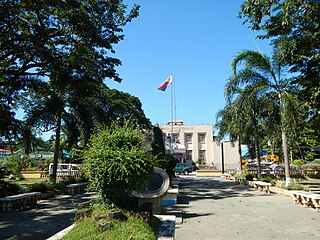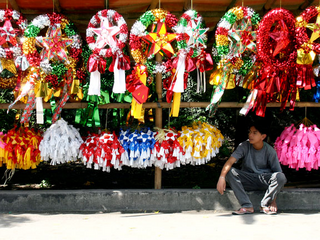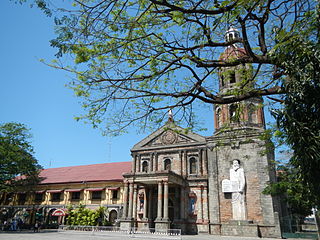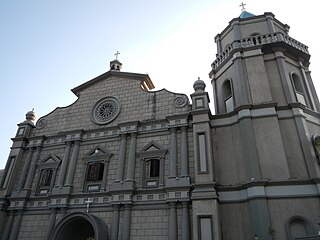
Pampanga is a province in the Central Luzon region of the Philippines. Lying on the northern shore of Manila Bay, Pampanga is bordered by Tarlac to the north, Nueva Ecija to the northeast, Bulacan to the east, the Manila Bay to the central-south, Bataan to the southwest and Zambales to the west. Its capital is the City of San Fernando. Angeles, while geographically within Pampanga, is classified as a first-class, highly urbanized city and is governed independently of the province.

Apalit, officially the Municipality of Apalit, is a 1st class municipality in the province of Pampanga, Philippines. According to the 2015 census, it has a population of 107,965 people.

Angeles, officially the City of Angeles, is a 1st class highly urbanized city in the province of Pampanga, where it is geographically situated but remains politically independent. It is located in the region of Central Luzon, Philippines. According to the 2015 census, it has a population of 411,634 people.

Macabebe, officially the Municipality of Macabebe, is a 1st class municipality in the province of Pampanga, Philippines. According to the 2015 census, it has a population of 75,850 people.

Masantol, officially the Municipality of Masantol, is a 2nd class municipality in the province of Pampanga, Philippines. According to the 2015 census, it has a population of 57,063 people.

Mexico, officially the Municipality of Mexico, is a 1st class municipality in the province of Pampanga, Philippines. According to the 2015 census, it has a population of 154,624 people. It was also formerly known as Nuevo México during the Spanish period.

The Kapampangan people, Pampangueños or Pampangos, are the sixth largest ethnolinguistic group in the Philippines, numbering about 2,784,526 in 2010. They live mainly in the provinces of Pampanga, Bataan and Tarlac, as well as Bulacan, Nueva Ecija and Zambales.

Holy Family Academy, also referred to by its acronym HFA, is a private Catholic basic education school administered by the Missionary Benedictine Sisters in Angeles City, Pampanga, Philippines. It was established in 1906 as a Catholic parochial school and named Colegio de la Sagrada Familia in 1910. It is now one of the most prestigious schools in Angeles City. It has both elementary and high school departments as well as kindergarten and preparatory school classes for younger students. The school follows the Benedictine tradition of Ora et Labora, which means "Prayer and Work".

A parol is a Filipino ornamental lantern displayed during the Christmas season. Parols are traditionally constructed using bamboo and Japanese paper, and are illuminated with candles, oil lamps, or carbide lamps. Modern parols can be made using other materials such as plastic, metal, and capiz shells and are usually illuminated with electric lighting. Its most-common form is a five-pointed star, although it can come in various shapes and sizes. Large disc-shaped electronic versions of parols produced in Pampanga are known as parul sampernandu.

The Roman Catholic Archdiocese of San Fernando is the archdiocese of the Latin Church of the Catholic Church in the province of Pampanga, Philippines and the suffragan sees of Balanga, Iba, and Tarlac. The current archbishop is Most Rev. Florentino G. Lavarias, D.D., who was installed on October 24, 2014 succeeding Most Rev. Paciano B. Aniceto, D.D..

María Beatriz del Rosario Arroyo y Pidal was a Filipino nun and the founder of the Dominican Sisters of the Most Holy Rosary of the Philippines.

Our Lady of Manaoag is a Roman Catholic title of the Blessed Virgin Mary venerated in Manaoag, Pangasinan, the Philippines.
Holy Week in the Philippines is a significant religious observance for the country's Catholic majority, the Iglesia Filipina Independiente or the Philippine Independent Church and most Protestant groups. One of the few majority Christian countries in Asia, Catholics make up 80 percent of the population, and the Church is one of the country's dominant sociopolitical forces.

The Minor Basilica of Saint Michael the Archangel , commonly known as the Tayabas Basilica, is a Roman Catholic basilica located in Tayabas, Quezon, Philippines under the Roman Catholic Diocese of Lucena. Its titular is Saint Michael the Archangel, whose feast is celebrated annually on September 29.

Our Lady of the Most Holy Rosary, Queen of the Caracol, known locally as Mahal na Birhen ng Santo Rosaryo, Reyna ng Karakol or Nuestra Señora Virgen del Santissimo Rosario, Reina de Caracol, is the patroness of the Municipality of Rosario, formerly known as Salinas, in Cavite province, Philippines.

The St. James the Apostle Parish Church, commonly known as Betis Church, is a Baroque style church located in the Betis District in Guagua in Pampanga, Philippines under the Roman Catholic Archdiocese of San Fernando. The church was established in 1607 and dedicated to Saint James, the Apostle. It was declared a National Cultural Treasure by the National Museum and the National Commission for Culture and the Arts.

The Saint Augustine Parish Church of Baliuag, commonly known as Baliuag Church, is a Roman Catholic church located in Plaza Naning at the poblacion of Baliuag, in Bulacan province, Philippines. The church is a parish church of the Diocese of Malolos, which is a suffragan of the Archdiocese of Manila.

The Santa Monica Parish Church, commonly known as the Minalin Church, is a Baroque church, located in poblacion area of San Nicolas in Minalin, Pampanga, Philippines. The church, built during the Spanish era, was declared a National Cultural Treasure by the National Commission for Culture and the Arts and the National Museum of the Philippines on August 27, 2011, one of 37 churches in the country bestowed that honor.

The Roman Catholic church of Orani, declared as an independent parish on April 21, 1714, and also known as Our Lady of the Most Holy Rosary Parish Church is a Neoclassical (heritage) Diocesan Marian Shrine and Pilgrimage church located in the center of Orani, Bataan in the Philippines.

Apalit Church is a Neo-Renaissance-style church located at Apalit, in the province of Pampanga, Philippines. The additional construction of the two towers beside the church served as reinforcements to improve the structural integrity of the church. Also, the church houses bells manufactured by the Sunicos.

























